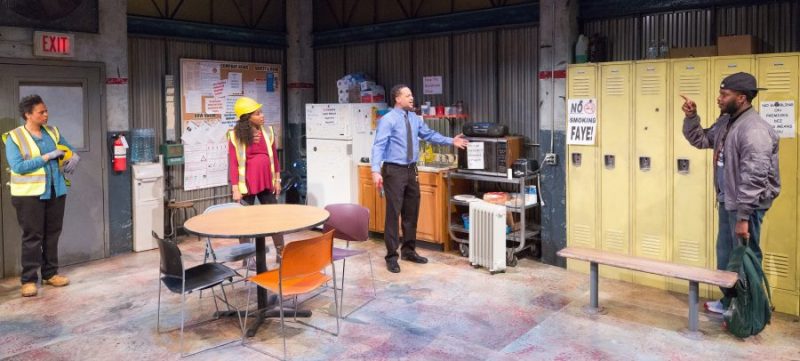
Skeleton Crew, by Dominique Morisseau. Peoples Light Theater, Malvern, PA, through July 15, 2018.
Skeleton Crew takes an issue that’s normally associated with Trump supporters and sees it through the lives of four black residents of Detroit. At a time when the nation is polarized, and even some theater-goers are resistant to plays they label as “black,” Skeleton Crew comes closer to universality than any other play around.
This is a beautiful drama that deals with the major societal problem of blue collar workers losing their jobs in an intimate manner — revealing the human dimensions with no preaching, no polemics.
The time is 2008 when an economic depression grips the United States and the place is Detroit where many factories have closed. We are in a “break room” in an automobile plant and we meet the cast members. Faye (Melanye Finister) is a union shop steward with family problems who has worked in this factory for 29 years. Reggie (Brian Marable) is her longtime friend who has risen to be a supervisor. Shanita (Patrese D. McClain) is a pregnant unmarried worker who is devoted to her job. And Dez (Joshua E. Nelson) is a secretive employee who seems to have a hidden agenda. Reggie’s boss is unseen, but the script makes clear that he too is black. All are powerless in the face of changes that they can’t control.
Rumors abound that the bosses will close their factory. Reggie knows that a decision has been made to shutter and he discloses it, in confidence, to Faye. He says he needs time to work out favorable termination arrangements for the employees—and for himself. As he wavers between enforcing the company line and trying to do what’s best for the workers, Faye is torn by her obligation to inform everyone and loyalty to her old friend.
Meanwhile, a series of thefts of steel from the assembly line adds additional stress.
Skeleton Crew puts its emphasis on character development, and we become attached to each of these individuals. Dialogue is nuanced and personalities are nicely developed as fear and paranoia grip the colleagues. Comparisons with August Wilson’s plays about community are apt. There’s also a hint of Clifford Odets and his identity with workers, although Morisseau’s language is more natural, less fevered.
All four actors give convincing performances, and McClain is especially arresting. She has a presence that’s spellbinding, combining intensity with humor.
Director Steve H. Broadnax III shows that he understands the play thoroughly. Tony Cisek designed the realistic set with its dented lockers. Jeromy Hopgood’s projections and Kathy Perkins’s lighting reinforce the sense of place. Marla Jurglanis’s costumes are apt, including an Obama “Hope” T-shirt from 2008.
There are small flaws. The role of Faye’s union is undeveloped. Even though we realize that this organization lacks the power of unions from the 1940s, we’d still like to see some efforts to confront management. The script reveals nothing, and implies abject passivity. Still, playwright Morisseau is so accomplished that I look forward eagerly to seeing other work by her. Peoples Light will present the world premiere of her new play, Mud Row, next year.